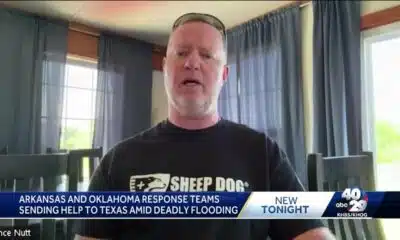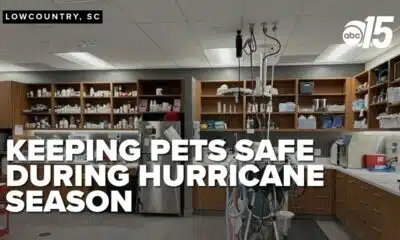News from the South - West Virginia News Feed
Vaccination rates are declining. They might get worse as states relax rules.
Vaccination rates are declining. They might get worse as states relax rules.
by Shalina Chatlani, West Virginia Watch
March 3, 2025
More states are loosening vaccine mandates, scaling back vaccine promotion efforts and taking other steps likely to lower vaccination rates — even as a major measles outbreak spreads in Texas.
Meanwhile, public health experts worry that the confirmation of vaccine skeptic Robert F. Kennedy Jr. as secretary of the U.S. Department of Health and Human Services could add fuel to such efforts, leading to the resurgence of long-tamed infectious diseases. Kennedy has made numerous baseless or false claims about vaccines, including linking them to autism and cancer and saying there is “poison” in the coronavirus vaccine.
This week, the U.S. Food and Drug Administration, which Kennedy now oversees, canceled the upcoming meeting of a scientific panel that was slated to discuss next year’s flu vaccines. Also this week, an unvaccinated child died of measles in Texas — the country’s first measles death in a decade. The outbreak, which has spilled into neighboring New Mexico, has now grown to more than 130 cases.
Already, vaccination rates are lower than they were before the pandemic. The COVID-19 vaccines saved millions of lives, but many Americans bristled at vaccine mandates, and disinformation and rapidly evolving public health advice undermined many people’s trust in scientific authorities.
Public health will always, to some extent, involve politics, because it requires resources. … But it doesn’t have to be partisan.
– Dr. Paul Offit, director of the Vaccine Education Center at Children’s Hospital of Philadelphia
Changing attitudes have had an impact: Vaccination rates among children born in 2020 and 2021 declined by between 1.3 and 7.8 percentage points for recommended shots, compared with children born in 2018 and 2019, according to a September report by the federal Centers for Disease Control and Prevention.The anti-vaccination trend is “the antithesis of public health,” Dr. Scott Rivkees, a pediatric endocrinologist who served as Florida’s surgeon general and health secretary from 2019 to 2021, told Stateline.
“The role of people in departments of health and the role of people in health care and medicine is to promote health and make sure the public is safe,” Rivkees told Stateline. “There’s such a rich history of legal precedent, such a rich history of public health precedent, saying that society benefits by having individuals vaccinated.”
In all 50 states plus the District of Columbia, children must receive certain vaccines to attend school. Every state offers an exemption for children who cannot be vaccinated for medical reasons. Thirty states plus the district allow families to skip the vaccinations for religious reasons, 13 states grant exemptions for religious or personal reasons, and two states — Louisiana and Minnesota — don’t require people to specify whether their objection is religious or personal.
Five states — California, Connecticut, Maine, New York and West Virginia — don’t allow nonmedical exemptions.
Republican officials in more than a dozen states have introduced legislation to loosen vaccine rules or otherwise reduce their use.
Legislation in Arizona would make it easier to claim a school exemption, while GOP-sponsored bills in Connecticut, Minnesota, New York and Oregon would limit or prohibit vaccine mandates for adults.
In Idaho, a Senate panel last week debated a bill that would ban mRNA vaccines, including COVID-19 vaccines, for a decade. Montana and Mississippi lawmakers considered but defeated similar proposals. And in West Virginia — one of the five states that currently does not allow nonmedical exemptions to school vaccine requirements — lawmakers are advancing a bill that would allow religious and philosophical objections.
“Public health will always, to some extent, involve politics, because it requires resources,” said Dr. Paul Offit, director of the Vaccine Education Center at Children’s Hospital of Philadelphia. Offit serves on the FDA panel that was supposed to discuss next year’s flu vaccines.
“But it doesn’t have to be partisan, which is what has happened.”
A shift in Louisiana
Earlier this month, Dr. Ralph Abraham, Louisiana’s first-ever surgeon general, sent a memo to staff at the Louisiana Department of Health saying they should no longer recommend that Louisianans get “any and all vaccines.” The memo also said the agency will “no longer promote mass vaccination.” Instead, Abraham said, health workers should encourage residents to discuss the risks and benefits of vaccines with their doctors.
The memo puts an end to the Louisiana health department’s robust history of promoting vaccinations through local public health departments, community health fairs and media campaigns.
“Vaccines should be treated with nuance, recognizing differences between seasonal vaccines and childhood immunizations, which are an important part of providing immunity to our children. … Getting vaccinated, like any other health procedure, is an individual’s personal choice,” the memo states.
The agency did not respond to multiple requests for comment via email and phone call. But in a letter posted to the department’s website earlier this month, Abraham wrote that the state had made several missteps during the pandemic, including: promoting “inaccurate and inconsistent guidance on masking, poor decisions to close schools, unjustifiable mandates on civil liberties, and false claims regarding natural immunity.”
Abraham wrote that vaccinations can be good for some, but can be harmful for others, and that for decades public health has been driven by an ideology that “the sacrifice of a few is acceptable and necessary for the ‘greater good.’”
“We should reject this utilitarian approach and restore medical decision-making to its proper place: between doctors and patients,” he wrote.
Louisiana Republican lawmakers have embraced this sentiment, saying that after the COVID-19 pandemic, they want to see less government involvement in vaccinations.
“I’m pleased that Dr. Abraham has taken this approach,” said Republican state Rep. Kathy Edmonston, who last year authored laws prohibiting Louisiana schools from requiring COVID-19 vaccinations and mandating that they provide exemption information to parents. “I’m not against vaccinations. He’s not against vaccinations. I’m for people being able to make up their own mind.”
Jill Hines, co-director of Health Freedom Louisiana, a group that opposes vaccine mandates, dismissed the significance of ending mass vaccination campaigns, because “everybody should have a primary care physician if they want one, and nobody is really denied access to a vaccine.”
But Kimberly Hood, former assistant secretary of the Louisiana Office of Public Health, noted that the state is largely rural, and many residents don’t have easy access to a health care provider.
“Failing to promote vaccination may not sound like a huge deal, but it actually invalidates what we in public health have seen and learned for many, many years, which is that you have to make it easy, affordable, accessible,” Hood told Stateline.
“It’s not just stepping away from vaccination; we’re stepping away from our kind of obligation together, what it means to live together in a society.”
Staying the course in Mississippi
But in neighboring Mississippi, which is also Republican-dominated, GOP leaders are staying the course — at least so far. More than two dozen anti-vaccine bills have died in the Mississippi legislature in the past two years, including this year’s proposed ban on mRNA vaccines.
The state struggled with COVID-19 vaccine hesitancy during the pandemic, and in 2022 Republican Gov. Tate Reeves signed into law a measure banning COVID-19 vaccine mandates.
But for years, Mississippi maintained one of the highest childhood vaccination rates in the nation. The state slipped from first to third between 2023 and 2024, after a federal judge ruled that the state must allow religious exemptions. Its current childhood vaccination rate is 97.5%, well above the 91% national average but lower than the 99.3% rate it had in 2019.
“Our law is still in effect, and if you don’t have a medical or religious exemption, then you must be fully vaccinated to attend school or go to day care in Mississippi,” said Dr. Daniel Edney, Mississippi’s state health officer. “The science is clear and in Mississippi we stand on the science.”
Edney said he hasn’t faced any political pressure to reverse course. Unlike in Louisiana, where Republican Gov. Jeff Landry tapped Abraham — a former three-term Republican congressman who co-chaired his transition committee — as surgeon general, Edney was selected by the 11-member Mississippi State Board of Health. The governor chooses the members of that panel, but they serve staggered four-year terms.
“I have zero pressure from the governor or legislative leadership regarding our approach to vaccines,” Edney told Stateline. “We’re not focused on politics. We don’t blow in the wind based on what administration is in power.”
GET THE MORNING HEADLINES.
West Virginia Watch is part of States Newsroom, a nonprofit news network supported by grants and a coalition of donors as a 501c(3) public charity. West Virginia Watch maintains editorial independence. Contact Editor Leann Ray for questions: info@westvirginiawatch.com.
The post Vaccination rates are declining. They might get worse as states relax rules. appeared first on westvirginiawatch.com
News from the South - West Virginia News Feed
Blanton Chiropractic & Neuropathy
SUMMARY: Blanton Chiropractic & Neuropathy features Dr. Blanton helping patients like Pam Hatfield find relief from neck and back pain. Dr. Blanton addresses those fed up with chronic pain, offering hope through his treatments. Pam shares her positive experience and the relief she found under his care. The clinic emphasizes accessible appointments and encourages people suffering from neck or back pain to seek help. Additionally, Dr. Blanton offers a gift card promotion for new patients. The practice aims to improve quality of life for those struggling with persistent pain through chiropractic and neuropathy care.
This segment is sponsored content and not a product of WSAZ news. For more Local News from WSAZ: https://www.wsaz.com/ …
News from the South - West Virginia News Feed
Trump’s bill gives tax breaks to metallurgical coal, rolls back credits for wind and solar
SUMMARY: The Inflation Reduction Act, dubbed the “Big Beautiful Bill” (B-b-b), provides a 2.5% tax credit for producing metallurgical coal, treating it as a critical mineral, benefiting coal-heavy states like West Virginia, the nation’s top met coal producer and exporter. This credit aims to stabilize mining jobs amid global steel production fluctuations and foreign competition. The bill also rolls back tax credits for wind and solar power and opens 4 million acres of federal land for mining. While coal advocates hope for eased EPA emission rules, critics highlight coal’s environmental impact and argue market forces, not regulation, have driven coal’s decline. The tax credit expires after 2024.
While President Trump’s Big, Beautiful Bill rolls back tax credits for wind and solar power, coal used in steel making will receive tax breaks.
_________________________________________
For the latest local and national news, visit our website: https://wchstv.com/
Sign up for our newsletter: https://wchstv.com/sign-up
Follow WCHS-TV on social media:
Facebook: https://www.facebook.com/eyewitnessnewscharleston/
Twitter: https://twitter.com/wchs8fox11
Instagram: https://www.instagram.com/wchs8fox11/
News from the South - West Virginia News Feed
Experts urge caution, focus on proven interventions as WV celebrates decrease in fatal overdoses
by Caity Coyne, West Virginia Watch
July 11, 2025
As West Virginia records the largest reduction in fatal overdoses across the nation over a 12 month period, substance use disorder experts are urging caution and encouraging the state to continue, while also increasing, the services available to people who use drugs.
According to data from the Centers for Disease Control and Prevention, West Virginia has seen two months of declines in the annual rate of fatal overdoses, representing a 41% decrease compared to deaths reported in both preceding 12 month periods.
The drop is decidedly good news for the state, which has for years been referred to as “ground zero” for the nation’s ongoing drug and overdose epidemic.
But even while celebrating, experts say it’s important to ensure the context and circumstances surrounding the decline is taken into account.
“Two months is not a lot of time,” said Michael Meit, director of the Center for Rural Health and Research at East Tennessee State University. “You need to make sure that trend continues and, if it does — which we all hope it will — that’s when you’ll know that the systems in place are working in a positive way.”
The data from the CDC represents overdose deaths recorded between January 2024 and January 2025, the most recent data available for analysis by the agency. The numbers are provisional and could increase as more deaths are analyzed.
According to the data, West Virginia so far has confirmed 787 deaths in that 12 month period. Between January 2023 and 2024, per the data, the state saw 1,351 residents die from overdoses.
Meit, who is also an associate professor in ETSU’s Department of Health Services Management and Policy, said there are several factors that could contribute to the state successfully curbing fatal overdose rates. Crucial context for the decline, he said, is how rates of both substance use and fatal overdoses related to that use increased so much during the pandemic.
In 2020, 1,343 West Virginians died from fatal overdoses — setting a new record for the state. In 2021, deaths increased again to 1,537, according to data from the state health department. The trend in the state reflected what was happening nationally; overdoses — fatal and otherwise — increased nearly everywhere while the COVID-19 pandemic unfolded.
In 2022, 2023 and 2024, overdose deaths in West Virginia dropped consecutively each year, per the data.
Now, Meit said, it’s likely conditions are evening out. The record decline could, at least in part, reflect this.
“Two months is not a lot of time. You need to make sure that trend continues and, if it does — which we all hope it will — that’s when you’ll know that the systems in place are working in a positive way.”
– Michael Meit, director of the Center for Rural Health and Research at East Tennessee State University
“I hope we’re turning a curve, but I’m a little bit of a skeptic at heart. West Virginia leading the nation [in the decline] implies that West Virginia is doing better than other places in addressing these issues. So I do think that it’s not just a blip, but there are other things to consider,” Meit said. “I am concerned that a lot of the declining overdose rates that we are seeing now — a partial factor is what we call a return to baseline. So we are essentially getting back to where we were pre-pandemic.”
The fatalities reported between January 2024 and 2025 are the lowest recorded in the state since 2015, when 735 people died from overdoses. At the time, that was the highest number reported by West Virginia in one year since 2001, when the state started tracking and reporting overdose deaths.
Dr. James Berry, who serves as chair for the Department of Behavioral Medicine and Psychiatry at West Virginia University’s Rockefeller Neuroscience Institute, said he was “encouraged” to see declines in the state. But like Meit, he’s cautious about assuming the declines will continue without further work, especially given where West Virginia still stands nationally.
“This decline means so many more lives will continue to exist because of efforts that have been going on in the state. At the same time, in West Virginia, we still lead the nation by far in the rates of overdose deaths,” Berry said. “We’ve had a wonderful decline, but still I don’t think people appreciate how far above we are other states [in the rate of fatal overdoses], above the national average. So we still have a very, very long way to go.”
‘We have to keep our foot on the pedal’
Gov. Patrick Morrisey celebrated the state’s decline in overdose deaths during a news conference in Princeton on Wednesday. In a release after, he said the state is “setting the standard for successfully battling addiction and saving lives.”
“Our nation-leading reduction in overdose deaths is the result of a holistic approach to tackle drug use and abuse,” Morrisey said. “We will continue to work hard together to prevent further senseless death in West Virginia.”
Meit has spent a lot of time researching what factors and policies, specifically, lead communities to decreasing or increasing their overdose rates.
One of his studies honed in on eastern Kentucky, a region both culturally and economically reminiscent of West Virginia’s southern coalfields.
West Virginia’s coalfield counties continuously lead the state — as well as the nation — in the rate of fatal overdoses. Not long ago, the counties in eastern Kentucky did the same.
But something happened in the 2010s that turned the tide in Kentucky.
Between 2012 and 2017, eight of the top 10 counties in the nation with the steepest decrease in overdose mortality were clustered in eastern Kentucky.
“What we found was a big investment in addressing the substance use crisis — in establishing harm reduction programs throughout the state, making sure they had treatment beds available, paying for treatment, engaging their criminal justice system,” Meit said. “These declines were studied over a 10 year period before the pandemic; we know it wasn’t just a blip — it was a direct response to the systems in place.”
Kentucky today, Meit said, has the most harm reduction sites of any state in the country. Most offer syringe service programs. The state also has the highest number of residential treatment beds and its Medicaid program includes a dedicated benefit for receiving substance use disorder treatment.
The environment in West Virginia, however, is much different.
Harm reduction programs are few and far between. Needs-based syringe service programs — which are the most effective at preventing disease among people who use drugs as well as transitioning people into recovery — are banned at the state level. There’s a shortage of treatment beds, especially in the regions hardest hit by the drug epidemic. There’s been a moratorium on establishing new methadone clinics in the state for years, meaning the medication — proven to be incredibly effective at helping people overcome opioid use disorder — isn’t available to most.
The current recovery and rehabilitation environment in West Virginia can largely be attributed to policies adopted by the state Legislature over the last decade. In the last several years, very few laws have been enacted by the body that reflect “best practices” for addiction and recovery; instead lawmakers have mostly focused on the criminalization of substance use disorder and the people who live with it.
Berry has worked in West Virginia studying and treating substance use disorder since 2002. He’s watched firsthand as the nature of the epidemic has shifted from prescription drug use to heroin use to, most recently, fentanyl. Each time, as new drugs have come into communities, overdoses have increased alongside increased use.
Berry has also watched how policies have evolved — or, in several ways, devolved — in response to the changes in the nature of the epidemic.
It’s likely, Berry said, that the decreases being celebrated this month in West Virginia reflect “the bearing of fruit that were the labors put in place, five to 10 years ago.”
Those “labors” include expanded access to naloxone, efforts to destigmatize addiction, recruiting health care workers with specific expertise on substance use disorder, increasing access to treatment programs as well as beds and an emphasis on educating both the public and providers about the disease.
Berry is slightly concerned that the successes being celebrated this month could mean a decreased focus by lawmakers on interventions that are working. To step back now, he said, would threaten future success.
“It’s so encouraging that we’ve got some traction. After so many years of going in the wrong direction, we finally have some traction but we have to keep our foot on the pedal and keep going forward,” Berry said. “If we don’t do that, if we don’t keep looking at what more we can do, then I really fear that we’re going to start getting worse again.”
YOU MAKE OUR WORK POSSIBLE.
West Virginia Watch is part of States Newsroom, a nonprofit news network supported by grants and a coalition of donors as a 501c(3) public charity. West Virginia Watch maintains editorial independence. Contact Editor Leann Ray for questions: info@westvirginiawatch.com.
The post Experts urge caution, focus on proven interventions as WV celebrates decrease in fatal overdoses appeared first on westvirginiawatch.com
Note: The following A.I. based commentary is not part of the original article, reproduced above, but is offered in the hopes that it will promote greater media literacy and critical thinking, by making any potential bias more visible to the reader –Staff Editor.
Political Bias Rating: Centrist
This article provides a factual report on West Virginia’s reduction in overdose deaths, highlighting data from reputable sources like the CDC and expert commentary without apparent ideological framing. It balances recognition of progress with cautious expert opinions urging sustained efforts, reflecting a pragmatic tone. The coverage includes criticism of state policies limiting harm reduction programs while acknowledging the successes of past interventions, presenting multiple perspectives without partisan language. Overall, it maintains a neutral stance focused on public health outcomes rather than promoting a specific political viewpoint or agenda.
-
The Center Square6 days ago
Here are the violent criminals Judge Murphy tried to block from deportation | Massachusetts
-
News from the South - Kentucky News Feed5 days ago
Woman arrested in Morgantown McDonald’s parking lot
-
News from the South - Kentucky News Feed6 days ago
Cruising into Louisville: Viking cruise ship docks downtown on Ohio River
-
News from the South - Oklahoma News Feed6 days ago
Cell, no! After Two Years of Debate, Schools Get Months to Ban Phones
-
News from the South - Arkansas News Feed6 days ago
Arkansas and Oklahoma teams deploy to aid Texas floods
-
News from the South - North Carolina News Feed5 days ago
Learning loss after Helene in Western NC school districts
-
News from the South - Florida News Feed6 days ago
Texas flooding: Search for survivors continues
-
News from the South - South Carolina News Feed7 days ago
Keep your pets safe during hurricane season: experts share advice on go-bags and safe spaces













































